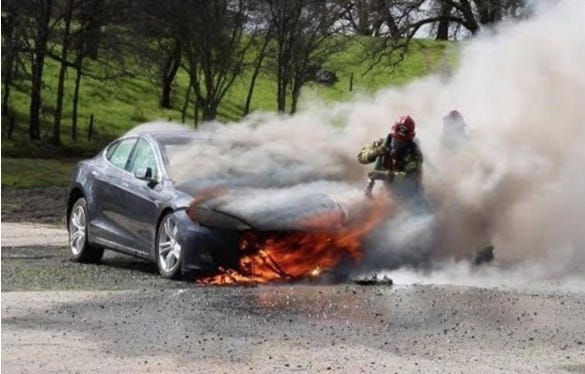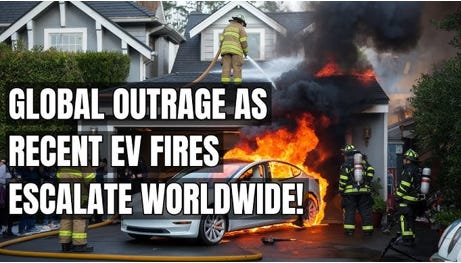EVs CAN REIGNITE AND THE PUBLIC SHOULD BE WARNED SAY WORRIED UK FIRE CHIEFS
By Cliff Reece
An electric car can burst into flames days after a fire appears to be extinguished.
UK’s fire chiefs say the public must be told about the huge fire risks posed by electric vehicles, as their government moves ahead with a ban on new petrol and diesel cars.
Damaged vehicles could burst into “explosive” flames and fires could resume days after they appeared to have been extinguished according to the National Fire Chiefs Council (NFCC), the professional voice of the UK fire and rescue service.
Blazes could also release toxic fumes and even the water used to put out electric vehicle fires could become poisonous and pollute the environment.
In a dramatic statement to MPs, the NFCC called for warnings to be installed at electric vehicle charging points across the country.
It said: “Increasing awareness that electric vehicles are powered by lithium-ion batteries which can cause severe and potentially explosive fires when they become faulty, damaged (mechanically or electrically) or are exposed to extreme heat is paramount.
“Thermal runaway can lead to the creation of toxic vapours and gases such as carbon monoxide, hydrogen fluoride and hydrogen chloride.
“Electric vehicle fires present new challenges for FRSs (fire and rescue services) as suppressing an electric vehicle fire requires large amounts of water and the fire can reignite hours or sometimes days later.
“Fire water that is contaminated with chemicals from battery fires is dangerous to the environment.”
Insisting it is vital to ensure safety information is presented to the public, the NFCC said: “More clear public information regarding electric vehicle chargepoint fault reporting is needed.
Electric vehicle chargepoints can also provide information about the warning signs of an electric vehicle fire and what to do if an electric vehicle fire is suspected or happening.”
The comments were made in a written submission to MPs looking at progress installing electric vehicle charging points in preparation for the switch to electric vehicles.
UK’s far-left socialist Labour government has re-instated a policy of ending the sale of new cars powered solely by internal combustion engines (ICE) by 2030, after the previous Conservative government delayed the ban to 2035.
All new cars and vans will also need to be 100% zero emission by 2035.
The UK government says it is set to meet its target of ensuring at least 300,000 chargepoints are in place by 2030 although their transport authority says this could fall far short of what is required, with up to 730,000 chargepoints needed.
MPs on the UK’s House of Commons Public Accounts Committee are holding an inquiry looking at the progress being made.
Meanwhile, in Australia, our Minister for High Energy Prices, Chris Bowen MP, is pressing ahead with his EV crusade despite mounting concerns about cost, environmental impact, and public safety.
He recently acknowledged that problems exist including lack of charging infrastructure, range anxiety, high costs, long waiting times, and lack of availability.
But he made no mention of the fire risk or the impact on our environment and road surfaces – the latter as a result of the extra weight of EVs compared to ICE vehicles.
EVs have frequently caught fire for no obvious reason – not just when charging.
These fires have caused massive damage to apartment buildings, underground car parks, shopping centres, and private homes with inbuilt garages.
The Albanese government should be issuing warnings but it isn’t because its totally unhinged and unnecessary priority is to achieve net zero - at any cost.
Or perhaps this weak and incompetent government believes that the fire experts are wrong – just as they think all 32 countries currently using nuclear power have got it wrong and only Albanese and Bowen know the real truth on these issues.
Thanks to Jonathan Walker, Whitehall Editor of the UK’S Daily Express






